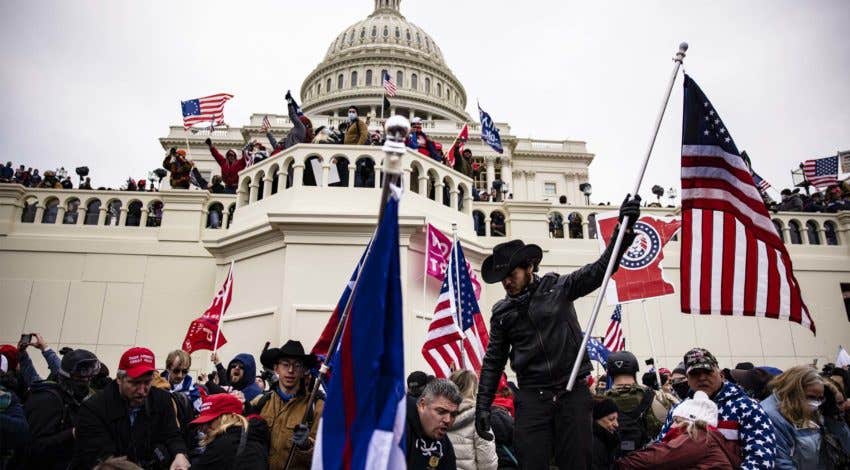Gun owners and non-owners alike see hope amidst concerns over political violence
Study revealed some concerning trends regarding political violence and reasons for optimism and potential avenues for preventive measures

Study has revealed some concerning trends regarding political violence and reasons for optimism and potential avenues for preventive measures. (CREDIT: Creative Commons)
A comprehensive survey conducted by the violence prevention research program at the University of California, Davis has revealed some concerning trends regarding political violence among certain subsets of gun owners in the United States. However, amidst these challenges, there are also reasons for optimism and potential avenues for preventive measures.
The study, titled "Firearm Ownership and Support for Political Violence in the United States," surveyed nearly 13,000 Americans, providing valuable insights into attitudes towards political violence, particularly among gun owners. While the findings do raise alarm, they also shed light on opportunities for intervention and mitigation.
Trends in Political Violence Susceptibility
One notable trend highlighted by the study is the increased susceptibility to political violence among specific groups of gun owners. Since the disruptions caused by the Covid-19 pandemic in 2020, there has been a rise in gun purchases, accompanied by a concerning openness to political violence among some firearm owners.
Firearm Ownership and Support for Political Violence in the US. (CREDIT: JAMA)
According to the survey, Americans who have purchased firearms since 2020, as well as those who frequently carry loaded guns in public, exhibit higher levels of susceptibility to political violence. Similarly, owners of assault-style rifles, often associated with mass shootings, displayed elevated levels of openness to political violence.
Understanding the Data
The survey participants were asked about their views on the justification of violence for various political objectives. Alarmingly, around 39% of gun owners expressed willingness to justify political violence, compared to 30% of non-owners. However, this disparity becomes more pronounced when examining specific subsets of gun owners.
Members of the ‘boogaloo boys’ join other gun rights advocates in Richmond, Virginia, on 18 January 2021. (CREDIT: Spencer Platt / Getty Images)
Among owners of assault-style rifles, 42% believed political violence could be justified, rising to 44% among recent gun purchasers, and a staggering 56% among those who frequently carry loaded guns in public.
Readiness to Engage in Violence
The study delved into the readiness of certain subgroups to engage in political violence. When presented with a hypothetical scenario where political violence was deemed justified, a significant proportion of gun owners who frequently carry loaded firearms in public expressed willingness to escalate to extreme measures.
Approximately 16.5% of these individuals stated they would be willing to shoot someone in such a situation, compared to lower percentages among other groups.
Related Stories
The survey also explored the political mindset of gun-owning subgroups, revealing a propensity towards more extreme positions. A substantial portion of public gun carriers, recent purchasers, and assault-type rifle owners expressed belief in the potential outbreak of civil war within the next few years, compared to non-owners.
A Call for Preventive Measures
Despite these concerning findings, the researchers emphasize that the majority of Americans, regardless of firearm ownership, unequivocally reject political violence. This sentiment, they argue, presents an opportunity for implementing effective violence prevention measures.
Approaching political violence as a public health problem, the research team hopes that their findings will inform preventive strategies for federal and state officials. By identifying and engaging individuals who reject political violence, regardless of gun ownership status, proactive measures can be taken to dissuade and deter potential perpetrators.
Firearm Ownership Status and Agreement With Statements Regarding Violence to Effect Social Change and the Likelihood of Civil War. (CREDIT: JAMA)
While the prevalence of political violence susceptibility among certain subsets of gun owners is indeed troubling, it is not insurmountable. By leveraging the rejection of political violence among the majority of Americans, targeted interventions can be designed to mitigate the risk of violence and promote a culture of peaceful discourse.
As the nation navigates through a politically charged landscape, characterized by heightened tensions and polarized rhetoric, proactive measures grounded in data-driven research offer a beacon of hope for a future defined by dialogue and understanding rather than division and violence.
For more science news stories check out our New Discoveries section at The Brighter Side of News.
Note: Materials provided above by Ohio State University. Content may be edited for style and length.
Like these kind of feel good stories? Get the Brighter Side of News' newsletter.



